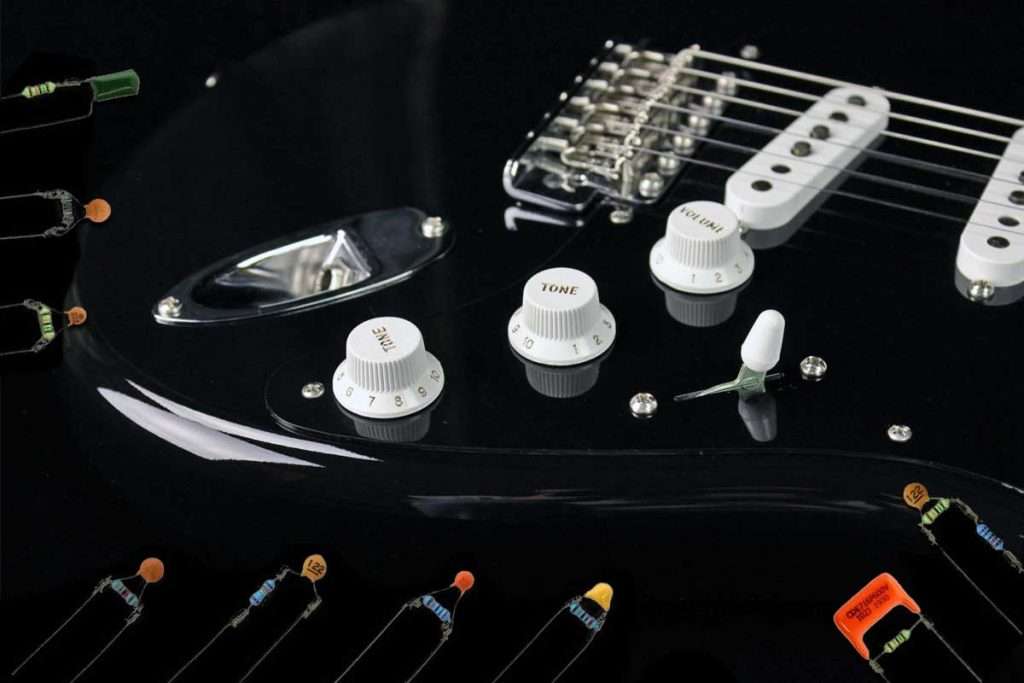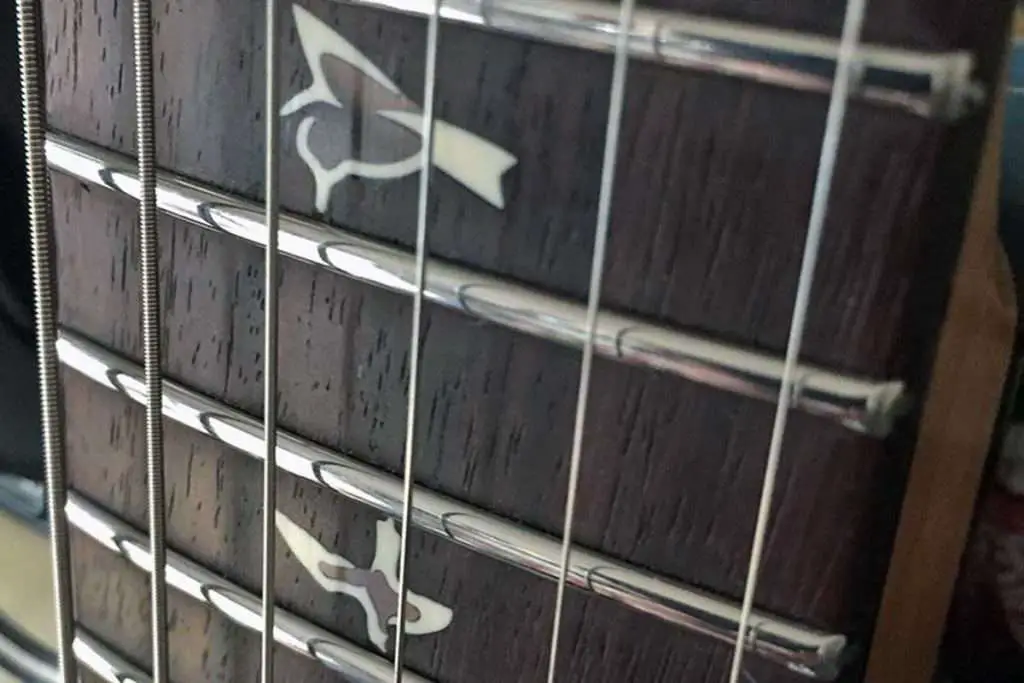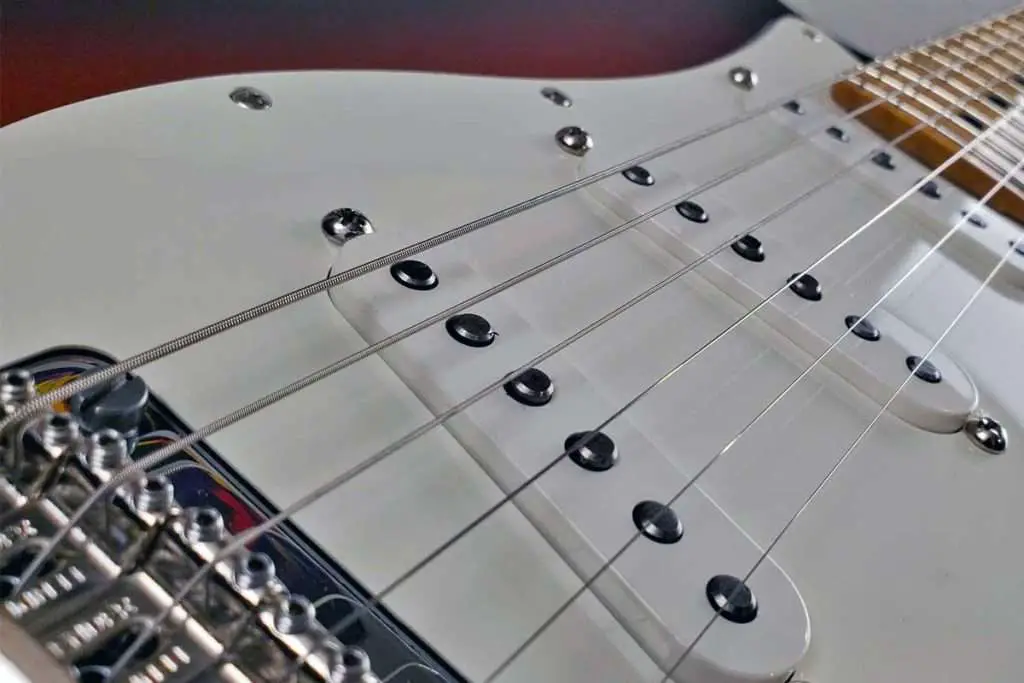Maintaining the cleanliness of your guitar strings is essential for preserving both the instrument’s condition and the quality of sound it produces. Over time, strings collect oils from your fingers, dust from the environment, and may begin to accumulate rust. These factors can deaden the tone and shorten the lifespan of your strings. In this article we learn how to clean guitar strings to maintain that new string sparkle, helping your guitar sounding vibrant and saving you some money by extending the life of your strings.
To clean your guitar strings effectively, you’ll need the right supplies and technique. It’s important to choose a cleaner that is specifically designed for guitar strings to prevent potential damage to the strings or the guitar itself. However, using a soft, lint-free cloth to gently wipe down your strings after each playing session can significantly reduce the buildup of grime and oxidation.
Understanding the impact of clean strings on your guitar’s tone is crucial. Pristine strings allow for clearer vibrations, resulting in a brighter and more resonant sound. In contrast, dirty strings can sound muted and dull. By prioritizing string cleanliness, you ensure that your guitar remains a reliable tool for expression, capturing the nuances of your playing style with each note.
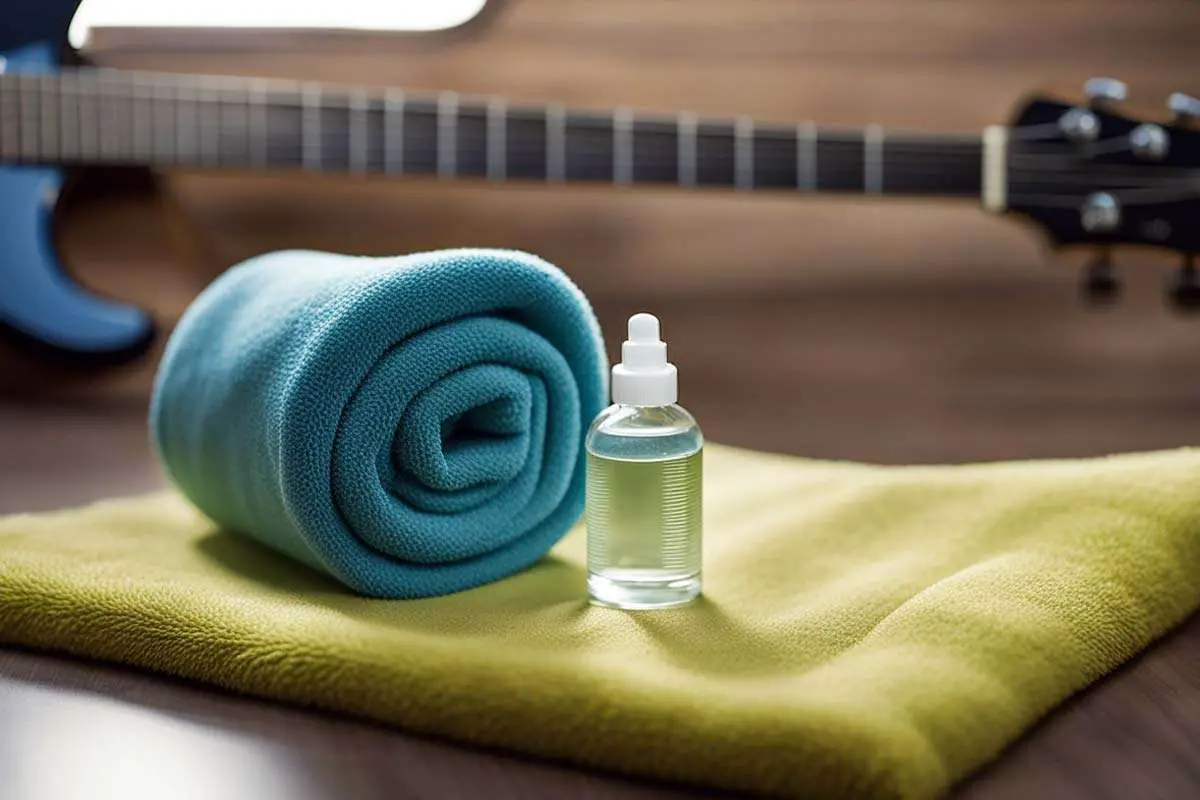
How To Clean Guitar Strings: The Essentials
Keeping your guitar strings clean not only preserves their sound quality but also extends their lifespan. Proper maintenance ensures that buildup of oils, sweat, and dirt is kept at bay, allowing you to play comfortably and maintain the integrity of your instrument.
Choosing the Right Cleaning Materials
Selecting suitable cleaning materials is crucial for preserving your instrument. Use a microfiber cloth for wiping down strings, as it effectively traps debris without damaging the strings. For deeper cleaning, consider specific string cleaners or a solution of isopropyl alcohol, as it dries quickly and doesn’t leave a residue. Lemon oil can be used sparingly on the fretboard, but avoid getting it on the strings.
The Cleaning Process Step-by-Step
- Loosen your strings slightly to access the entire string surface.
- Gently wipe the surface of each string with a clean cloth to remove surface oils and dirt.
- Apply a small amount of cleaning solution or alcohol to the cloth and clean each string thoroughly.
- Allow to air dry, then give a final cleaning pass to remove any residues before tightening the strings back to the correct tuning.
- Overall, this process should only take 5 minutes and worth doing if you want to extend the life of your strings.
Maintaining String Health and Longevity
To maintain string health, make it a habit to clean your strings after every playing session. This removes residues of sweat and oils before they can corrode the metal. Once the metal begins to corrode, it can develop tiny pits & rough spots that make it harder to keep clean & corrosion-free. You can also supplement this with a string lubricant, which can also enhance playing comfort by reducing friction when fretting.

Addressing Common Cleaning Challenges
Dirt and grime may accumulate on strings over time, resulting in dulled sound and difficult playability. If standard cleaning doesn’t restore string quality, consider a specialized string cleaning tool designed to fit between frets and strings. Always be cautious with household items to avoid scratching or harming your strings.
Tips for Optimal Results
- Keep your cleaning materials ready and accessible to integrate string cleaning into your routine.
- When cleaning, support the neck of your guitar to avoid unnecessary stress on the instrument.
- Use dedicated fretboard oils sparingly and take care not to overcondition, which can attract more dirt.
Remember, consistent and correct care of your guitar strings can drastically improve both the sound and the longevity of your instrument.
Advanced Care and Troubleshooting
Maintaining the performance and longevity of your guitar strings requires attention beyond simple wiping and cleaning. Tailoring your approach to specific scenarios will ensure that your instrument sounds its best and that your strings serve you well over time.
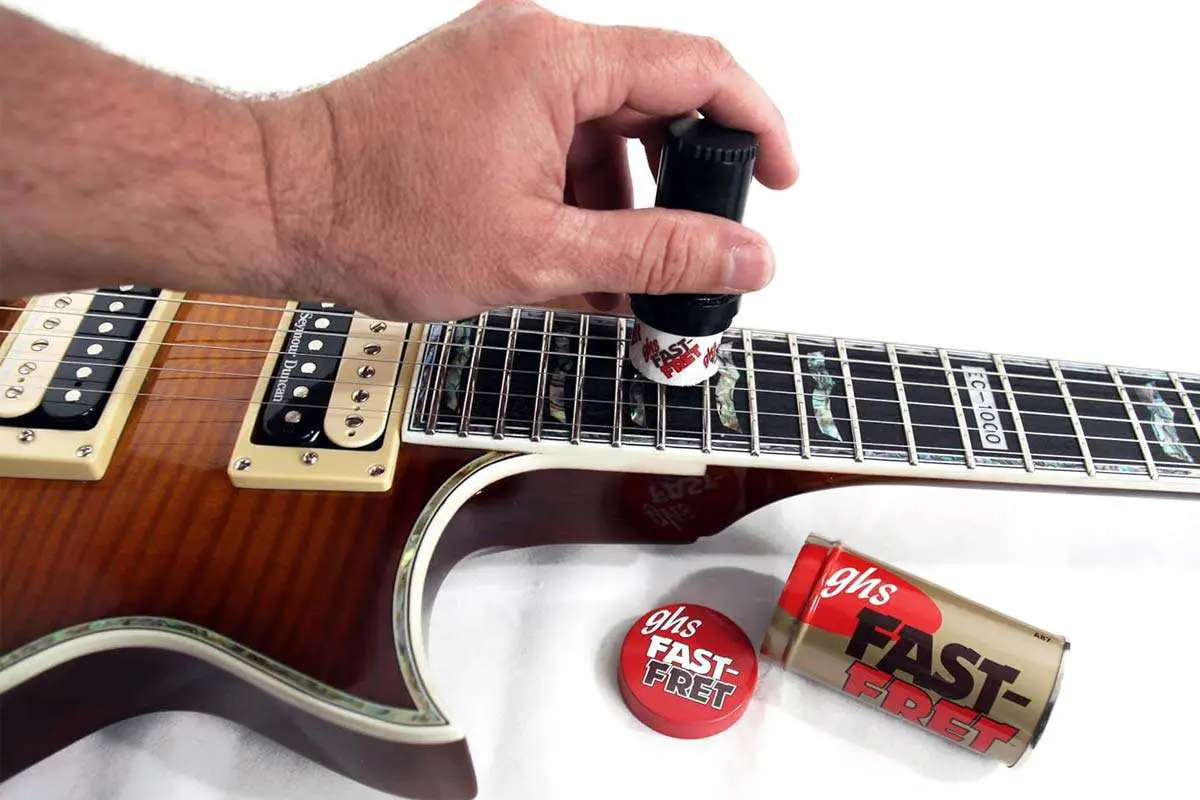
Enhancing String Performance
To enhance string performance, consider using a product like GHS Fast Fret to not only clean your strings but also to lubricate them, reducing finger noise for a smoother playing experience. A light coating on your guitar strings can make a significant difference in how they vibrate and sustain.
If you’re trying to save a few bucks, I also recommend getting yourself a small bottle of mineral oil and using that as a string lubricant as it’s the main ingredient in many string products. Simply apply a couple of drops to a clean cloth and wipe it on each string individually.
When to Replace Strings vs. When to Clean
Understanding when to replace strings as opposed to cleaning them is crucial. Strings that have lost their tone, do not stay in tune, or show visible damage or ongoing corrosion should be replaced. For strings that are dirty or have reduced vibrancy, a good cleaning may be all that’s needed to restore their brightness.
DIY Solutions and Alternatives
For DIY solutions and alternatives, avoid using harsh household cleaners. Instead, opt for a gentle wipe down with a microfiber cloth & alcohol and use mineral oil afterwards if you want to lubricate your strings as a performance enhancement.
If you’re really trying to preserve your strings and need a deep clean, boiling guitar strings can help remove grime from steel strings. If you get to this point, you should really consider a new set. If you do go through with this procedure, be sure to let the strings cool sufficiently before handling them and dry them thoroughly to prevent corrosion. Note: Boiling is not appropriate for nylon strings.
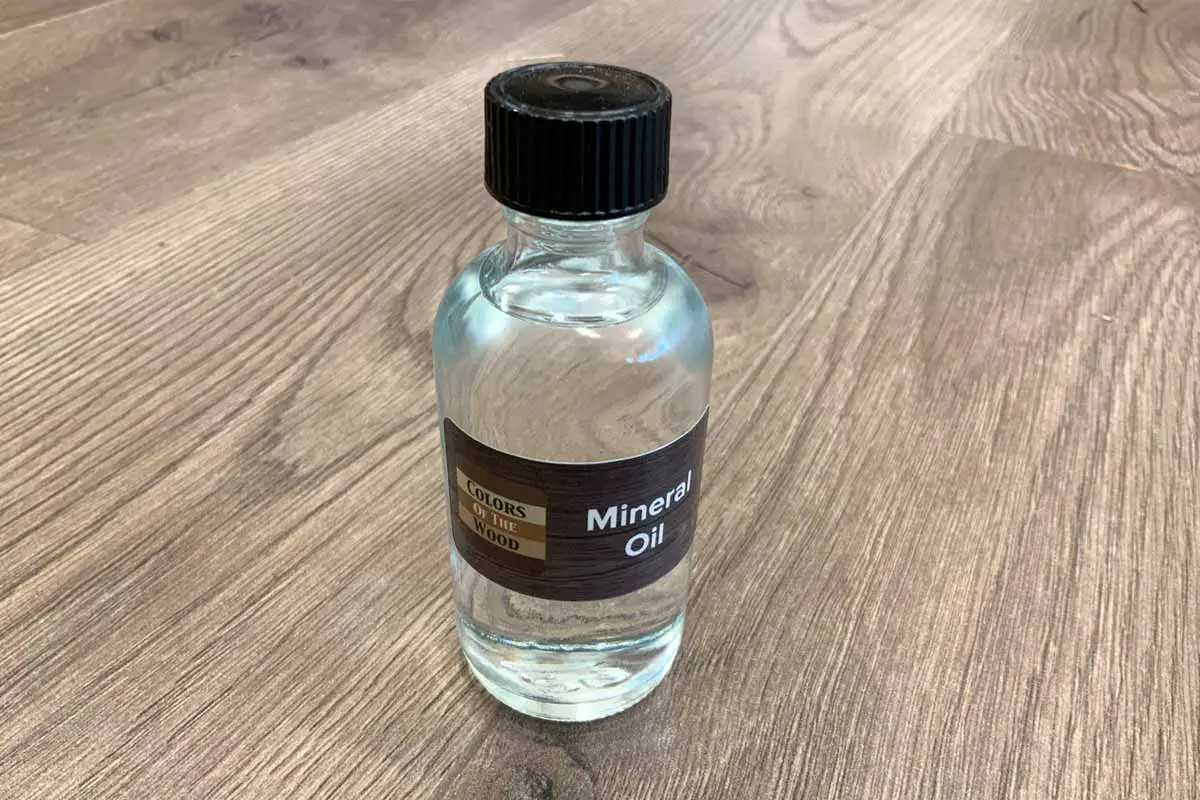
Special Considerations for Different Types of Guitars
Different instruments require different care. For electric guitars with a lacquered fretboard, avoid abrasive materials like steel wool that can damage the fretboard. Nylon stringsg> on classical guitars are sensitive and should not be treated with products designed for steel strings.
Frequency of Cleaning for Optimal Playability
Other Guitar Maintenance Articles
| Component | Related Articles |
|---|---|
| Body Finish | How to clean your guitar’s body |
| Bridge & Tailpiece | How to clean a guitar bridge |
| Fingerboard | How to clean your fretboard |
| Frets | How to clean your guitar frets |
| Pickups | How to clean pickups |
| Pots | How to clean guitar potentiometers |
| Strings | How to clean guitar strings |
| Tuners | How to clean guitar tuners |
Frequently Asked Questions
What is the most effective way to clean nylon guitar strings?
Is it safe to clean guitar strings with alcohol?
Can disinfectant wipes be used to clean guitar strings without causing damage?
Are there any household products that can be safely used to clean guitar strings?
What ingredients are commonly found in commercial guitar string cleaners?
Commercial guitar string cleaners often contain a blend of mild solvents and lubricants designed to remove residue without damaging the string. Common ingredients include isopropyl alcohol and mineral oils, which help clean and protect the strings. If you want a DIY lubricant for your strings, simply opt for a small bottle of mineral oil and apply a couple of drops to a cloth before applying to each individual string.

